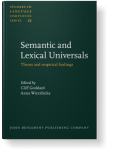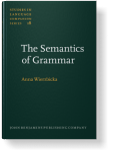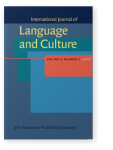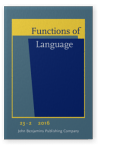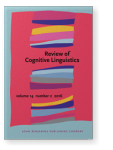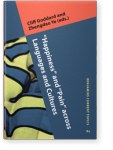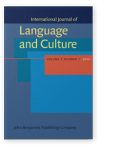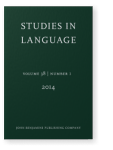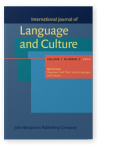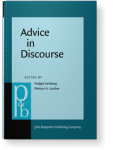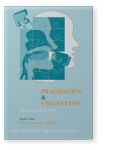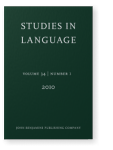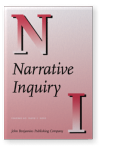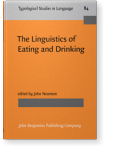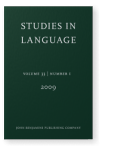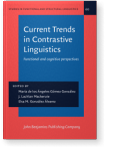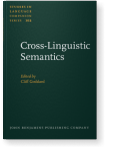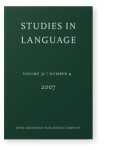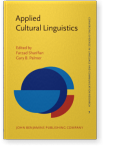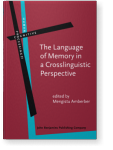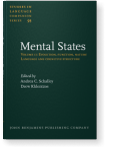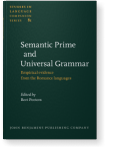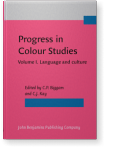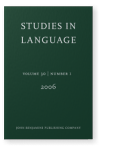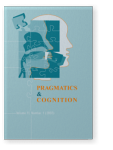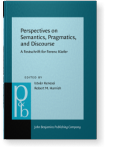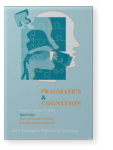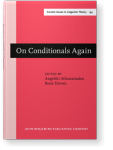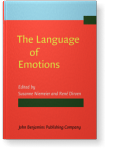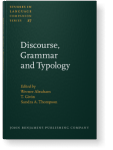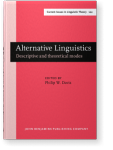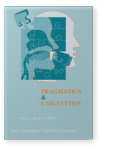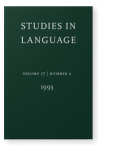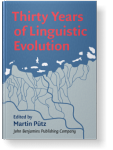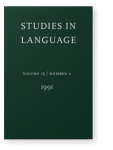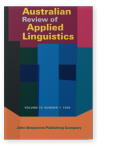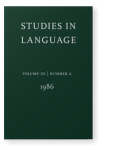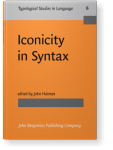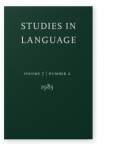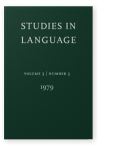Anna Wierzbicka
List of John Benjamins publications for which Anna Wierzbicka plays a role.
Journal
Titles
Cognitive Exploration of Language and Linguistics: Second revised edition
Edited by René Dirven † and Marjolijn H. Verspoor
[Cognitive Linguistics in Practice, 1] 2004. xii, 277 pp.
Subjects Cognition and language
The Body in Description of Emotion: Cross-linguistic studies
Edited by N.J. Enfield and Anna Wierzbicka
Special issue of Pragmatics & Cognition 10:1/2 (2002) vi, 369 pp.
Subjects Cognitive linguistics | Pragmatics | Semantics
Meaning and Universal Grammar: Theory and empirical findings. Volume 1
Edited by Cliff Goddard and Anna Wierzbicka
[Studies in Language Companion Series, 60] 2002. xvi, 337 pp.
Subjects Semantics | Theoretical linguistics | Typology
Meaning and Universal Grammar: Theory and empirical findings. Volume 2
Edited by Cliff Goddard and Anna Wierzbicka
[Studies in Language Companion Series, 61] 2002. xvi, 337 pp.
Subjects Semantics | Theoretical linguistics | Typology
Meaning and Universal Grammar: Theory and empirical findings. 2 Volumes (set)
Edited by Cliff Goddard and Anna Wierzbicka
[Studies in Language Companion Series, 60-61] 2002. xvi, 337 pp. & xvi, 337 pp.
Subjects Semantics | Theoretical linguistics | Typology
Cognitive Exploration of Language and Linguistics
René Dirven † and Marjolijn H. Verspoor
[Cognitive Linguistics in Practice, 1 (1999)] 1999. xiv, 300 pp.
Subjects Cognition and language
Semantic and Lexical Universals: Theory and empirical findings
Edited by Cliff Goddard and Anna Wierzbicka
[Studies in Language Companion Series, 25] 1994. viii, 510 pp.
Subjects Functional linguistics | Semantics
The Semantics of Grammar
Anna Wierzbicka
[Studies in Language Companion Series, 18] 1988. x, 617 pp.
Subjects Semantics | Syntax | Theoretical linguistics
Articles
2019 The biblical roots of English ‘love’: The concept of ‘love’ in a historical and cross-linguistic perspective International Journal of Language and Culture 6:2, pp. 225–254 | Article
Seen from a broad cross-linguistic perspective, the English verb (to) love is quite unusual because it has very broad scope: it can apply to a mother’s love, a husband’s love, a sister’s love, etc. without any restrictions whatsoever; and the same applies to its counterparts in many other… read more
2016 Explicating the English lexicon of ‘doing and happening’ Functions of Language 23:2, pp. 214–256 | Article
This study proposes NSM semantic explications for a cross-section of the English verbal lexicon of ‘doing and happening’. The twenty-five verbs are drawn from about a dozen verb classes, including verbs for non-typical locomotion (crawl, swim, fly), other intransitive activities (play, sing),… read more
2016 “Walking” and “running” in English and German: The conceptual semantics of verbs of human locomotion Review of Cognitive Linguistics 14:2, pp. 303–336 | Article
This study examines the conceptual semantics of human locomotion verbs in two languages – English and German – using the Natural Semantic Metalanguage approach. Based on linguistic evidence, it proposes semantic explications for English walk and run, and their nearest counterparts in German, i.e.… read more
2016 “Pain” and “suffering” in cross-linguistic perspective “Happiness” and “Pain” across Languages and Cultures, Goddard, Cliff and Zhengdao Ye (eds.), pp. 19–43 | Article
This chapter builds on findings of the author’s 1999 book Emotions Across Languages and Cultures: Diversity and Universals, which tentatively identified eleven universals pertaining to human emotions. The chapter probes some of those “emotional universals” further, especially in relation to… read more
2015 A whole cloud of culture condensed into a drop of semantics: The meaning of the German word Herr as a term of address International Journal of Language and Culture 2:1, pp. 1–37 | Article
This paper investigates the meaning and use of the German word Herr as a form of address, in a historical and cross-linguistic perspective. The paper argues that despite their apparent insignificance, generic titles used daily across Europe, and in all the parts of the world to which European… read more
2014 Semantic fieldwork and lexical universals Studies in Language 38:1, pp. 80–127 | Article
The main goal of paper is to show how NSM findings about lexical universals (semantic primes) can be applied to semantic analysis in little-described languages. It is argued that using lexical universals as a vocabulary for semantic analysis allows one to formulate meaning descriptions that are… read more
2014 “Pain” and “suffering” in cross-linguistic perspective "Happiness" and "Pain" across Languages and Cultures, Goddard, Cliff and Zhengdao Ye (eds.), pp. 149–173 | Article
This paper builds on findings of the author’s 1999 book Emotions Across Languages and Cultures: Diversity and Universals, which tentatively identified eleven universals pertaining to human emotions. The paper probes some of those “emotional universals” further, especially in relation to ‘laughing’,… read more
2012 Chapter 14. ‘Advice’ in English and in Russian: A contrastive and cross-cultural perspective Advice in Discourse, Limberg, Holger and Miriam A. Locher (eds.), pp. 309–332 | Chapter
This paper argues that the English word advice encodes a language-specific perspective on the universe of discourse and that to analyse discourse in other languages and cultures in terms of this culture-specific English word would involve imposing on them an Anglocentric perspective. The paper… read more
2012 Understanding others requires shared concepts Culture – Language – Cognition, Dascal, Marcelo † (ed.), pp. 356–379 | Article
“It is a noble task to try to understand others, and to have them understand you (…) but it is never an easy one”, says Everett (p. 327). This paper argues that a basic prerequisite for understanding others (and also for having them understand you) is to have some shared concepts on which this… read more
2010 ‘Want’ is a lexical and conceptual universal: Reply to Khanina Studies in Language 34:1, pp. 108–123 | Article
The question of whether or not all languages have a word for ‘want’ (as in ‘I know what you want, I want the same’) is far more important than many linguists appear to realize. Having studied and debated this question for many years, we welcome Olesya Khanina’s (2008) paper “How universal is… read more
2010 ‘Story’ — An English cultural keyword and a key interpretive tool of Anglo culture Narrative Inquiry 20:1, pp. 153–181 | Article
This paper shows that story is an English cultural keyword and a key interpretive tool of modern Anglo culture and that it is linked with a family of concepts which have no semantic equivalents in other languages and are unique conceptual artefacts of Anglo culture. It argues that if we can… read more
2009 All people eat and drink. Does this mean that 'eat' and 'drink' are universal human concepts? The Linguistics of Eating and Drinking, Newman, John (ed.), pp. 65–89 | Article
Eating and drinking are, one might say, human universals. Or so it may seem to speakers of English, and other European languages. But what would a Kalam, or a Warlpiri linguist say about it, given that Kalam and Warlpiri have no word meaning ‘eat’ and no word meaning ‘drink’? No doubt, he/she would… read more
2009 “Reciprocity”: An NSM approach to linguistic typology and social universals Studies in Language 33:1, pp. 103–174 | Article
This paper develops a semantic approach to the study of “reciprocity” — an area increasingly seen as central to linguistic typology. “Reciprocal” and “reflexive-reciprocal” constructions from five languages — English, Russian, Polish, French and Japanese — are analyzed in considerable detail. The… read more
2008 Universal human concepts as a basis for contrastive linguistic semantics Current Trends in Contrastive Linguistics: Functional and cognitive perspectives, Gómez González, María de los Ángeles, J. Lachlan Mackenzie and Elsa M. González Álvarez (eds.), pp. 205–226 | Article
This study sets out to demonstrate that the NSM metalanguage of semantic primes provides a stable language-neutral medium for fine-grained contrastive semantic analysis, in both the lexical and grammatical domains. The lexical examples are drawn from “yearning-missing” words in English, Polish,… read more
2008 2. New semantic primes and new syntactic frames: "Specificational BE" and "abstract THIS/IT" Cross-Linguistic Semantics, Goddard, Cliff (ed.), pp. 35–57 | Article
2007 NSM analyses of the semantics of physical qualities: sweet, hot, hard, heavy, rough, sharp in cross‑linguistic perspective Studies in Language 31:4, pp. 765–800 | Article
All languages have words, such as English hot and cold, hard and soft, rough and smooth, and heavy and light, which attribute qualities to things. This paper maps out how such descriptors can be analysed in the natural semantic metalanguage (NSM) framework, in terms of like and other semantic… read more
2007 7. Semantic primes and cultural scripts in language learning and intercultural communication Applied Cultural Linguistics: Implications for second language learning and intercultural communication, Sharifian, Farzad † and Gary B. Palmer (eds.), pp. 105–124 | Chapter
Because meaning is fundamental to language and culture, a practical technique for describing meanings and transposing them across languages has multiple practical applications. This chapter demonstrates several applications of the NSM approach to semantics: as a guide to core vocabulary in the… read more
2007 2. Is "remember" a universal human concept? "Memory" and culture The Language of Memory in a Crosslinguistic Perspective, Amberber, Mengistu (ed.), pp. 13–39 | Article
Speaking of “elementary notions, common to everyone in the human race, that can be expressed in all languages”, Umberto Eco (2000: 87–88) states: “Most certainly, every man has a notion of what it means to (. . .) to remember”. This paper argues that Eco is mistaken and that ‘remembering’ is not a… read more
2007 3. Shape and colour in language and thought Mental States: Volume 2: Language and cognitive structure, Schalley, Andrea C. and Drew Khlentzos (eds.), pp. 37–60 | Article
2006 Preface Semantic Primes and Universal Grammar: Empirical evidence from the Romance languages, Peeters, Bert (ed.), pp. 1–6 | Miscellaneous
2006 The semantics of colour: A new paradigm Progress in Colour Studies: Volume I. Language and culture, Biggam, Carole P. and Christian Kay (eds.), pp. 1–24 | Article
2006 Shape in grammar revisited Studies in Language 30:1, pp. 115–177 | Article
2003 The meaning of the particle lah in Singapore English Pragmatics & Cognition 11:1, pp. 3–38 | Article
In this paper we try to crack one of the hardest and most intriguing chestnuts in the field of cross-cultural pragmatics and to identify the meaning of the celebrated Singaporean particle lah — the hallmark of Singapore English. In pursuing this goal, we investigate the use of lah and seek to… read more
2002 Introduction: The body in description of emotion The Body in Description of Emotion: Cross-linguistic studies, Enfield, N.J. and Anna Wierzbicka (eds.), pp. 1–25 | Article
Anthropologists and linguists have long been aware that the body is explicitly referred to in conventional description of emotion in languages around the world. There is abundant linguistic data showing expression of emotions in terms of their imagined ‘locus’ in the physical body. The most… read more
2002 2. Semantic Primes and Universal Grammar Meaning and Universal Grammar: Theory and empirical findings, Goddard, Cliff and Anna Wierzbicka (eds.), pp. 41–85 | Article
2002 Preface to Volume II Meaning and Universal Grammar: Theory and empirical findings, Goddard, Cliff and Anna Wierzbicka (eds.), pp. xv ff. | Miscellaneous
2002 Opening Statement Meaning and Universal Grammar: Theory and empirical findings, Goddard, Cliff and Anna Wierzbicka (eds.), pp. 1–3 | Miscellaneous
2002 2. Semantic primes and Universal Grammar in Polish Meaning and Universal Grammar: Theory and empirical findings, Goddard, Cliff and Anna Wierzbicka (eds.), pp. 65–144 | Article
2002 4. Semantic Primes and Linguistic Typology Meaning and Universal Grammar: Theory and empirical findings, Goddard, Cliff and Anna Wierzbicka (eds.), pp. 257–300 | Article
2001 Leibnizian linguistics Perspectives on Semantics, Pragmatics, and Discourse: A Festschrift for Ferenc Kiefer, Kenesei, István and Robert M. Harnish (eds.), pp. 229–253 | Article
2000 The semantics of human facial expressions Facial Information Processing: A multidisciplinary perspective, Dror, Itiel E. and Sarah V. Stevenage, pp. 147–183 | Article
This paper points out that a major shift of paradigm is currently going on in the study of the human face and it seeks to articulate and to develop the fundamental assumptions underlying this shift. The main theses of the paper are: 1) Facial expressions can convey meanings comparable to the… read more
1997 Conditionals and counterfactuals: conceptual primitives and linguistic universals On Conditionals Again, Athanasiadou, Angeliki and René Dirven † (eds.), pp. 15 ff. | Article
1997 A response to Michael Bamberg The Language of Emotions: Conceptualization, expression, and theoretical foundation, Niemeier, Susanne and René Dirven † (eds.), pp. 227 ff. | Article
1995 A Semantic Basis for Grammatical Typology Discourse, Grammar and Typology: Papers in honor of John W.M. Verhaar, Abraham, Werner, T. Givón and Sandra A. Thompson (eds.), pp. 179 ff. | Article
1995 Dictionairies vs. encyclopaedias: how to draw the line Alternative Linguistics: Descriptive and theoretical modes, Davis, Philip W. (ed.), pp. 289 ff. | Article
1994 2 Introducing Lexical Primitives Semantic and Lexical Universals: Theory and empirical findings, Goddard, Cliff and Anna Wierzbicka (eds.), pp. 31 ff. | Chapter
1994 "Cultural scripts": A new approach to the study of cross-cultural communication Language Contact and Language Conflict, Pütz, Martin (ed.), pp. 69–87 | Article
1994 17 Semantic Primitives Across Languages: A Critical Review Semantic and Lexical Universals: Theory and empirical findings, Goddard, Cliff and Anna Wierzbicka (eds.), pp. 445 ff. | Review
1994 Opening Statement Semantic and Lexical Universals: Theory and empirical findings, Goddard, Cliff and Anna Wierzbicka (eds.), pp. 1 ff. | Miscellaneous
1993 Reading human faces: Emotion components and universal semantics Pragmatics & Cognition 1:1, pp. 1–23 | Article
It is widely believed that there are some emotions (so-called "basic emotions ") which are universally associated with distinctive facial expressions and that one can recognize, universally, an angry face, a happy face, a sad face, and so on. The "basic emotions " are believed to be part of the… read more
1993 Why do We Say in April, on Thursday, at 10 O'Clock? In Search of an Explanation Studies in Language 17:2, pp. 437–454 | Article
Why do we say ON Thursday but AT 10 o'clock? Or why do we say AT night but IN the morning? One common answer to such questions is to dismiss the problem: this is the way we speak because this is the way to speak; it is all arbitrary, conventional, idiosyncratic. It is argued that such answers are… read more
1992 The search for universal semantic primitives Thirty Years of Linguistic Evolution: Studies in honour of René Dirven on the occasion of his 60th birthday, Pütz, Martin (ed.), pp. 215 ff. | Article
1991 Semantic Rules Know no Exceptions Studies in Language 15:2, pp. 371–398 | Article
1990 Cross-cultural pragmatics and different values Australian Review of Applied Linguistics 13:1, pp. 43–76 | Article
The author argues that the differences in the ways of speaking prevailing in different societies and different communities are profound and systematic, and reflect the different cultural values. In the past, the extent of the differences between different language communities in their ways of… read more
1986 What's in a Noun? (Or: How Do Nouns Differ in Meaning from Adjectives?) Studies in Language 10:2, pp. 353–389 | Article
1985 “oats” and “wheat”: the fallacy of arbitrariness Iconicity in Syntax: Proceedings of a symposium on iconicity in syntax, Stanford, June 24–26, 1983, Haiman, John (ed.), pp. 311 ff. | Article
1983 The Semantics of Case Marking Studies in Language 7:2, pp. 247–275 | Article
1979 Ethno-Syntax and the Philosophy of Grammar Studies in Language 3:3, pp. 313–383 | Article
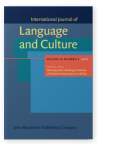
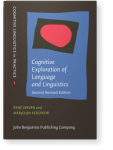
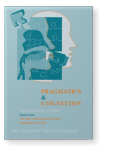
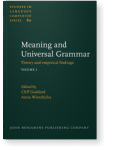
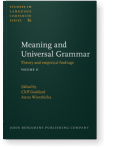

.hb.png)
